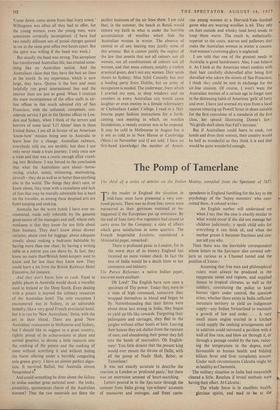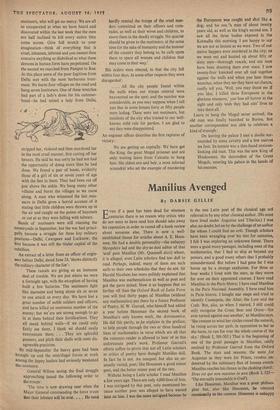The Pomp of Tamerlane
The third of a series of articles on the Indian Mutiny, compiled from the Spectator of 1857.
o the reader in England the situation in I mid-June must have presented a very con- fused picture. There was no front line; towns were massacred as their garrisons mutinied or be- leaguered if the Europeans put up resistance. By the end of June forty-five regiments had ceased to carry arms for the Company; a state of affairs which gave satisfaction in some quarters. The French Imperialist Estafette, considered a Ministerial paper, remarked : There is profound panic in London; for in the worst days of its history England has received no more violent check. In fact the loss of India would be a death blow to her commerce and industry.
The Parsee Reformer, a native Indian paper, was even more exultant : Oh Lord The English have now seen a specimen of Thy power. Today they, were in a state of high command, tomorrow they wrapped themselves in blood and began to fly. Notwithstanding that their forces were about three lacs strong in India, they began to yield up life like cowards. Forgetting their palanquins and carriages, they fled to the jungles without either boots or hats. Leaving their houses they ask shelter from the meanest of men; and abandoning their power they fell into the hands of marauders. Oh English- men! You little dreamt that the present king would ever mount the throne of Delhi, with all the pomp of Nadir Shah, Baber, or Tamerlane!
It was not exactly accurate to describe the reaction in London as 'profound panic,' but there was an enormous amount of heart-searching.
Letters poured in to the Spectator through the summer from India giving 'eye-witness' accounts of massacres and outrages; and from corre- spondents in England fumbling for the key to the psychology of the `Sepoy monsters' who com- mitted them. A colonel writes : An English mother will understand me when I say that the case is exactly similar to what would occur if she did not manage her children judiciously; a spoilt child asks for everything it can think of, and when the mother grants it becomes fractious and can- not tell you why.
Then there was the inevitable correspondent whose letters to the Spectator also covered sub- jects as various as a Channel tunnel and the position of Venus : Assuming that free men and philosophical rulers must always be produced in the temperate zones and regions, and supplied thence to tropical climates, as well as the soldiery, constituting the police to keep human tigers under control, the question arises, whether there exists in India sufficient mountain territory to yield an indigenous supply—any Indian Switzerland to maintain a growth of law and order. . . . A very small steam engine erected in a kitchen could supply the cooking arrangements and in addition could surround a pavilion with a wall of fine rain, and blow air through it, or through a passage cooled by the rain, reduc- ing the temperature to the degree, most favourable to human health and bidding bilious fever and liver complaints avaunt. Under such circumstances Calcutta might be as healthy as Chamonix, The military situation in India had meanwhile cleared a little. Resolute if brutal methods were having their effect. At Calcutta : The whole force is in excellent health, glorious spirits, and mad to be at the mutineers, who will get no mercy. We are all so exasperated at what we have heard and discovered within the last week that the men are half inclined to kill every native they come across. Give full stretch to your imagination—think of everything that is cruel, inhuman, infernal and you cannot then conceive anything so diabolical as what these demons in human form have perpetrated. On the second we marched from Paniput to Rae. At this place some of the poor fugitives from Delhi met with the most barbarous treat- ment. We burnt four villages on the road and hung seven lumberars. One of these wretches had part of a lady's dress for his cummer- bund—he had seized a lady from Delhi, stripped her, violated and then murdered her in the most cruel manner, first cutting off her breasts. He said he was sorry he had not had the opportunity of doing more than he had done. We found a pair of boots, evidently those of a girl of six or seven years of age with the feet in them. They had been cut off just above the ankle. We hung many other villains and burnt the villages as we came along. A man who witnessed the last mas- sacre in Delhi gives a horrid account of it stating that little children were thrown up in the air and caught on the points of bayonets or cut at as they were falling with tulwars.
Bands of mutineers were still roaming the countryside in September, but the war had princi- pally become a struggle for three key military positions—Delhi, Cawnpore and Lucknow; the first because it was still the titular capital of the rebellion.
An extract of a letter from an officer of engin- eers before Delhi, dated June 24, 'shows distinctly the military character of the foe' : These rascals are giving us an immense deal of trouble. We are just where we were a fortnight ago, with the exception of having built a few batteries. The mutineers fight like daemons and being about six or seven to one attack us every day. We have lost a great number of noble soldiers and officers, and have killed an enormous number of the enemy; but we arenot strong enough to go in at them behind their fortifications. They all sneak behind walls—if we could only fairly see them, I think we should easily exterminate them. . . . They are splendid gunners, and pitch their shells with most dis- agreeable precision.
By mid-September the heavy guns had been brought up and the centrifugal forces at work among the Sepoy leaders had seriously weakened the resistance.
General Wilson seeing the final struggle approaching issued the following order to the troops: 'The time is now drawing near when the Major General commanding the force trusts that their labours will be over. . . . He need hardly remind the troops of the cruel mur- ders committed on their officers and com- rades, as well as their wives and children, to move them in the deadly struggle. No quarter should be given to the mutineers; at the same time for the sake of humanity and the honour of the country they belong to, he calls upon them to spare all women and children that may come in their way.'
His orders were obeyed, in that the city fell within four days. In some other respects they were disregarded : . . . All the city people found within the walls when our troops entered were bayonetted on the spot; and the number was considerable, as you may suppose when I tell you that in some houses forty or fifty people were hiding. These were not mutineers, but residents of the city who trusted to our well- known mild rule for pardon. 1 am glad to say they were disappointed.
An engineer officer describes the first raptures of victory : We are getting on capitally. We have got the King, the great Mogul prisoner and are only waiting leave from Calcutta to hang him. His eldest. son and heir, a most infernal scoundrel who set the example of murdering the Europeans was caught and shot like a dog; and his son,'a man of about twenty years old, as well as the king's second son. I saw all the three bodies exposed in the Kotwallie this morning. I am happy to say we are not as lenient as we were. Two of our native Sappers were murdered in the city; so we went out and hunted up about fifty or sixty men—thorough rascals, and our men have been shooting them ever since. I saw twenty-four knocked over all tied together against the walls and when you hear those wretches, when they see they have no chance, coolly tell you, 'Well, you may shoot me if you like; I killed three Europeans in the glorious massacre,' you lose all horror at the sight and only wish they had cats' lives to take them all.
Leave to hang the Mogul never arrived; the old man was finally banished to Burma. But another correspondent was able to celebrate a kind of triumph : On leaving the palace I met a doolie sur- rounded by some cavalry and a few natives on foot. Its inmate was a thin-faced anxious- looking old man. This was the new King of Hindoostan, the descendent of the Great Moguls, entering his palace in the hands of his enemies.































 Previous page
Previous page